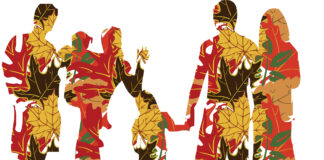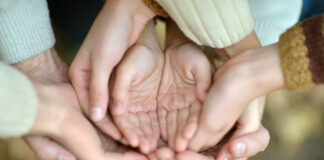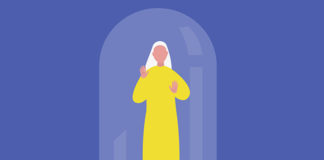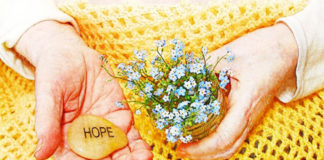Tag: family support
My Lived Experience Helps Others Heal: Working with Families on the Path...
If one person is struggling, everyone in the family is struggling. Families need support.
Reality According to Whom? Listening to My Wife—and The Problems with...
Sam Ruck shares an excerpt from his book "Healing Companions," which describes his life with, and love for, his wife and her “alters.”
Survivors and Families Working Together For Change: A New Project
Based on his lived experience, Ron Bassman describes his efforts to create an educational and support program that links families with survivors.
Changing Brains, Changing Minds: Psychiatric Drug Withdrawal and the Marital Relationship
As family support people for those caught in the mental health system, our job is to mitigate as much of the trauma as we can.
The Bipolar Rollercoaster: Looking Beyond the Labels
Removing assumptions evoked by my family member’s diagnoses has transformed my understanding of their experience and increased my ability to arrive at solutions applicable to their expressed needs.
Q&A: How Can I Best Support My Child’s Withdrawal from Psychiatric...
Two experts offer do's and don'ts on "being there" during the challenging and sometimes time-consuming process of safely discontinuing mental health medications.
Making Mental Health an Ongoing Priority: A Patch Adams Approach
My brother’s sudden death and Mental Health Awareness Month spurred me to spend May making small, very personal efforts to both honor his memory and move the mental health conversation forward.
The Worst Thing: How My Mother’s Death Pushed Me to Overcome...
The goal of creating a legacy for my mother required that I go beyond managing my symptoms to confronting my OCD at its roots. I had to fundamentally change my understanding of anxiety.
Mental Hell-Care: My Sibling’s Story
Doctors refuse to believe psychiatric medications have caused my sibling, Pat, any harm. Over a three-year period, however, Pat's insurance companies have paid out more than one million dollars to warehouse Pat and to provide "treatment" that has caused complete disability.
Mental Health Services Turned My Daughter’s Crisis into a Way of...
My world turned upside down when my daughter nearly died from a serious suicide attempt. After several years as her caretaker I began to wonder: What can we do to change the way our mental health services are organized so they won't turn a crisis into a way of life for already distressed and vulnerable people?
Where Can Families Turn for Help?
Watching my son be subjected to continuous harm by the drugs, how can I pretend that it's okay to maintain this abusive system of care? Who will push for accountability? As a mother, I want to share a meaningful connection with my son. I want to witness him happy, healthy and living the life he chooses.
D.C. Faces Lawsuit for Unnecessarily Institutionalizing Hundreds of Kids
From The Bazelon Center for Mental Health Law: "The Bazelon Center, along with co-counsel Disability Rights DC at University Legal Services (the protection and advocacy...
Married Individuals with Schizophrenia Show Better Outcomes, Study Finds
14-year study of a rural sample in China shows those who were married had higher rates of remission from schizophrenia.
Listening to, Rather Than Trying to Fix, My Suicidal Wife
From The Guardian: One man shares how listening to his wife when she experienced suicidality, rather than rushing to action or attempting to dissuade her...
How Love, Support, and Exercise Build Resilience After Trauma
In this piece for ABC News, Farz Edraki and Lucy Fahey present five stories of people who have recovered from traumatic events through various means,...
Landmark Schizophrenia Study Recommends More Therapy
Results of a large government-funded study call into question current drug heavy approaches to treating people diagnosed with schizophrenia. The study, which the New York Times called “by far the most rigorous trial to date conducted in the United States,” found that patients who received smaller doses of antipsychotic drugs with individual talk therapy, family training, and support for employment and education had a greater reduction in symptoms as well as increases in quality of life, and participation in work and school than those receiving the current standard of care.
Is This Depression? Or Melancholy? Or…
We live in a culture bombarded by media and sped up by rapid-fire social interactions. It's definitely useful to grab hold of a simple, short, sound-bite term, to quickly describe what we are feeling or suffering. "Depression" is such a word - it evokes and encapsulates, conjures the images of that ugly pit of despair that can drive so many to madness and suicide. Yet at the same time the words we use, strangely, become like those pens deposited in medical offices and waiting rooms around the world: ready at hand, easily found, familiar -- and tied to associations, marketing and meanings we were only dimly aware were shaping how we think.
Opening the Dialogue: Can Families and Survivors Heal Together?
If we believe that emotional problems are primarily disorders of the brain, then perhaps taking a “fill-in-the-blank” medical history is sufficient. However, if we believe that emotional crises and dis-ease are problems that exist between people, in our sticky or not-so-sticky web of relationships, then whether families, survivors and those in crisis can heal together is a much more relevant, if still complicated, question. Perhaps the most honest answer to this question is: “It depends..."
Man Jumps, News at…?
It is time for a new understanding of suicidal feelings and actions. Perhaps a more open dialogue, without fear of sirens and police and involuntary hospitalizations, would have made a difference for one young man here in Asheville last month. Perhaps more public local conversation would have saved some of the 45 lives we lost here in Buncombe County in 2010. Perhaps a more public and safe national conversation would have saved some of the 22 veterans who died from suicide every day in 2010.
We Are All Adam Lanza’s Mother (& other things we’re...
I do not understand how we can continue to avoid the conversation about psychiatric medications and their role in the violence that is affecting far too many of our children, whether Seung-Hui Cho, Eric Harris, Kip Kinkel, or Jeff Weise (all of whom were either taking or withdrawing from psychotropic medications) or the scores of children and adults they have killed and harmed. It is not clear what role medications played in the Newtown tragedy, though news reports are now suggesting there is one.
Building a Bridge to Hope
Hope heals. Thousand of years of experience and, more recently, numerous hope studies, prove this to be true. Yet hope is still a 4-letter word in many mental health settings. How can we build a bridge to hope from hope-stealing physical and emotional pain, hopeless diagnoses and prognoses, and hope-numbing side effects?
What Are We Recovering From? Making a Case for Recovery
Is “recovery” a useful concept or is it overused, co-opted or simply not an accurate way to describe the process of learning to work with and through madness and life’s challenges. Mother Bear Community Action Network explores these arguments and makes a case for recovery.
Shanghai’d in Recovery
I am honored to share the story of one family that has learned about the power of language, hope and letting go with love so that every family member can grab on to a life worth living.
Whose Recovery Is This?! Helping Families Heal
Last night I had the privilege of attending my first Family Den with other Mother Bears like myself—parents, spouses, siblings and adult children. All of us have family members who have experienced mental health challenges. All of us had a story to tell.
Snake Medicine: Transforming Our Stories
The stories we tell ourselves and others have the power to heal or to harm. This is a story about how we define mental health, the challenges we face in pursuit of it, and the power of transforming our stories.
























